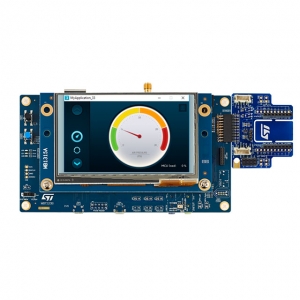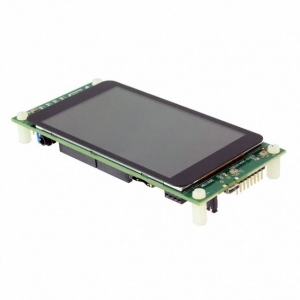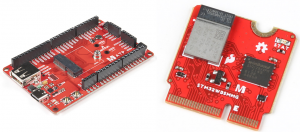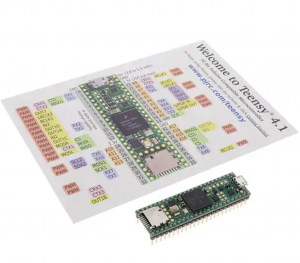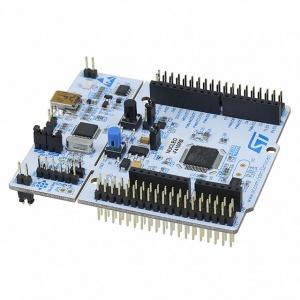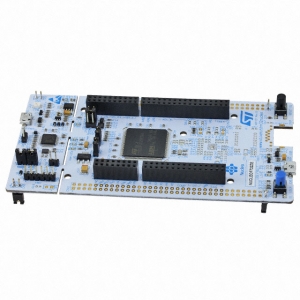برد PocketBeagle
OSD3358 PocketBeagle - MPU ARM® Cortex®-A8 Embedded Evaluation Board
What is PocketBeagle?
PocketBeagle is an ultra-tiny-yet-complete open-source USB-key-fob computer. PocketBeagle features an incredible low cost, slick design and simple usage, making PocketBeagle the ideal development board for beginners and professionals alike.
Processor: Octavo Systems OSD3358 1GHz ARM® Cortex-A8
- 512MB DDR3 RAM integrated
- Integrated power management
- 2×32-bit 200-MHz programmable real-time units (PRUs)
- ARM Cortex-M3
Summary of Key Features
- Low cost Linux computer with tremendous expansibility
- Opportunity to learn many programming aspects from educators on-line
- Openness and flexibility tear-down limits on your imagination
Summary of Technical Specifications
- Based on new Octavo Systems OSD3358-SM 21mm x 21mm system-in-package that includes 512MB DDR3 RAM, 1-GHz ARM Cortex-A8 CPU, 2x 200-MHz PRUs, ARM Cortex-M3, 3D accelerator, power/battery management and EEPROM
- 72 expansion pin headers with power and battery I/Os, high-speed USB, 8 analog inputs, 44 digital I/Os and numerous digital interface peripherals
- microUSB host/client and microSD connectors
برد PocketBeagle
Specifications:
a. TexasInstruments®SitaraTMAM3358Processor(IntegratedintheOSD3358-SM):
i. 1GHz ARM® Cortex-A8 with NEON floating-point accelerator
ii. SGX530 graphics accelerator
iii.2x programmable real-time unit (PRU) 32-bit 200MHz microcontrollers with single-cycle I/O latency
iv. ARM® Cortex-M3 for power and security management functions b. Memory:
i. 512MB DDR3 800MHZ RAM (Integrated in the OSD3358-SM) ii. 4kB I2C EEPROM (Integrated in the OSD3358-SM) iii.SD/MMC Connector for microSD
c. SoftwareCompatibility
i. Debian GNU/Linux images customized for BeagleBone
ii. Cloud9 IDE on Node.js w/ BoneScript library
iii.Any BeagleBone Black software not needing access to unavailable expansion pins
d. Connectivity
i. High speed USB 2.0 OTG (host/client) micro-B connector (USB0) ii. Bootable microSD card slot (MMC0)
e. Expansionheader
i. High speed USB 2.0 OTG (host/client) control signals (USB1)
ii. 8 analog inputs with 6 at 1.8V and 2 at 3.3V along with 1.8V voltage references
iii.44 digital GPIOs accessible with 18 enabled by default including 2 shared with the 3.3V analog input pins
iv. 3 UARTs accessible with 2 enabled by default (UART0, UART4)
v. 2 I2C busses enabled by default (I2C1, I2C2)
vi. 2 SPI busses with single chip selects enabled by default (SPI0, SPI1) vii.4 PWM outputs accessible with 2 enabled by default (PWM0A, PWM1A) viii.2 quadrature encoder inputs accessible
ix.2 CAN bus controllers accessible
x. 23 programmable real-time unit (PRU) 32-bit microcontroller I/O pins including options for the PRU UART and eCAP accessible with 7 I/O pins enabled by default for PRU0 and 1 enabled by default for PRU1
xi.3 voltage inputs with 1 for battery, 1 shared with the USB connector and 1 for power-line input and a battery temperature sense input
xii.2 voltage outputs, 1 with a 3.3V LDO and 1 with switch from voltage input
xiii.Power and reset button I/Os
-
Power management:
i. TPS65217C PMIC is used along with a separate LDO to provide power to the system (Integrated in the OSD3358) with integrated 1-cell LiPo battery support
-
Debug Support:
i. JTAG test pointsii. gdb and other monitor-mode debug possible
-
Power Source
i. microUSB connector
ii. expansion header (3 options: battery, VIN or USB-VIN)
-
User Input / Output
i. Power Button with press detection interrupt via TPS65217C PMIC (hold for 10s to initiate hardware power cycle)






